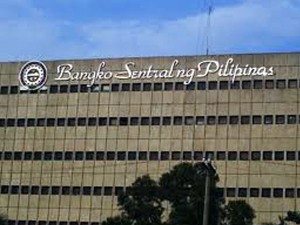MANILA, Philippines—The Bangko Sentral ng Pilipinas kept interest rates at current levels during the meeting of its Monetary Board on Thursday, believing another move to control liquidity would be imprudent given the slower-than-expected growth of the economy in the first semester.
With the decision, the BSP’s overnight borrowing and lending rates, which influence commercial interest rates, remain at 4.5 and 6.5 percent, respectively. The reserve requirement, the proportion of deposits that banks must keep at the BSP as reserves, remains at 21 percent.
Since inflation pressures have somewhat eased anyway, the BSP said, another move to temper growth of money in the economy would not be necessary. What the central bank finds important at the moment is to help boost economic growth.
“The Monetary Board’s decision is based on its assessment that current monetary policy settings remain appropriate given a manageable inflation environment and subdued economic outlook,” BSP Governor Amando Tetangco Jr. said on Thursday, in a press conference held immediately after the meeting by the Monetary Board.
The decision made during Thursday’s policy-setting meeting, which usually happened once every six weeks, came after the BSP earlier this year hiked interest rates twice and increased the reserve requirement also twice.
The previous moves were meant to temper growth of liquidity within the economy and slow down inflation, which was earlier feared to go beyond the target amid increasing demand and rising cost of imports, such as oil.
High interest rates dampen demand for bank loans, while higher reserve requirement for banks reduces the available money for lending.
But this time, the BSP said, inflation would remain well within the target of 3 to 5 percent for this year, taking into account impact of the previous hikes in interest rate and reserve requirement.
According to the National Statistics Office, inflation averaged at 4.3 percent in the first eight months of the year. Based on latest projections by the BSP, inflation this year could average at 4.46 percent and at slower pace of 3.4 percent next year. For 2013, the BSP sees inflation averaging at an even slower pace of 3.23 percent.
Economists said the problem now has shifted to the slow growth of the economy, which grew by only 3.4 percent in the second quarter. The government is aiming for a growth of 5 to 6 percent in 2011.
Economists have called for higher spending by the government to hit the target.
The BSP described interest rates as just “appropriate” to aid in efforts to boost economic growth. Any increase in the rate could thus be disadvantageous for the economy, the central bank said.
“The Monetary Board believes that the current monetary stance remains in line with the need to safeguard price stability and support sustained economic growth,” Tetangco said.
